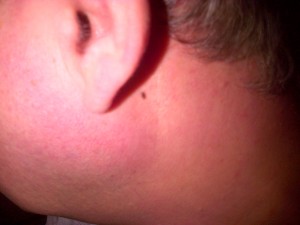“Your glands are up!”
How many of us can remember that phrase from our childhoods. Indeed in each year, according to the UK’s National Health Service 1 in 200 people will contract glandular fever. That being said, most people who get glandular fever are in their late teens and early twenties.
When I was at school one of my fellow students had a bout of glandular fever resulting in weeks if not months off sick.
So I felt that it could well be useful to produce a brief guide to glandular fever as part of our series of informational blogs. As with all our blogs your participation is most welcome. It would be great to hear about your experiences of glandular fever and its impact upon your life and health. This will, we hope, provide support for others in a similar situation.
The majority of people who develop glandular fever do so in a period of around two months after contracting the Epstein-Barr virus. This is perhaps the most common virus which has been covered in a previous blog here https://patienttalk.org/calling-everyone-with-an-autoimmune-condition-have-you-ever-been-infected-with-the-epstein-barr-virus/. I think the comments section is of particular value.
The main symptoms of glandular fever are:-
1) Fever. As the name suggests of course. In this case it is likely to be over 38ºC or 100.4ºF (in old money).
2) Swollen nodes or glands in the neck. Hence the name glandular fever.
3) Sore throat.
4) Fatigue. You can read more about the impact of fatigue by checking out our recent patient experience blog. https://patienttalk.org/fatigue-like-wet-cement-exploring-the-difference-between-tiredness-and-fatigue/
In some cases there are a number of rarer symptoms. These can include jaundice and swollen adenoids. Jaundice is more common with people in the older age brackets who contract glandular fever.
Normally the infection lasts about two or three weeks, starting to get better after around one week albeit slowly. That being said the fatigue may last for up to six months after the other symptoms have disappeared.
In milder forms of the fever treatments are normally painkillers which also help fight the inflammation. In more serious cases hospitalisation may be required.
It is worth noting that there does seem to be a link between Epstein–Barr viral infection and contracting a number autoimmune conditions and other illnesses. In particular Parkinson’s disease, Lupus (https://patienttalk.org/?tag=lupus), rheumatoid arthritis (https://patienttalk.org/?tag=rheumatoid-arthritis), and multiple sclerosis (https://patienttalk.org/?tag=multiple-sclerosis).
So over to you. We are always really interested in the experiences of our readers of their medical conditions. It would be great if you could share your glandular fever story in the comments box below.
You might care to consider the following questions while sharing your story:-
a) At what age did you develop glandular fever?
b) What were your symptoms?
c) Do you know what the cause was?
d) How you were treated and how successful were the treatments?
e) Finally, if you contracted the Epstein–Barr virus did you have any complications afterwards such as an autoimmune condition?
Please just think of these questions as a guideline. It would be great if you could share anything you think may be of interest about glandular fever.
Thanks very much in advance.




